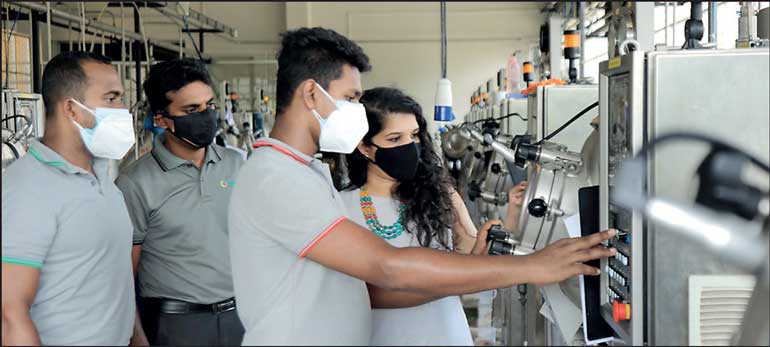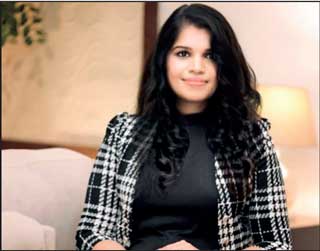Wednesday Feb 25, 2026
Wednesday Feb 25, 2026
Wednesday, 13 October 2021 00:00 - - {{hitsCtrl.values.hits}}

Leonie at the Hayleys Fabric factory in the Fabric Dyeing Department
One of the greatest global challenges is to integrate environmental sustainability with economic growth. At the heart is ‘Sustainable consumption and production’ or United Nations Sustainable Development Goal 12, which has
 |
| Hayleys Fabric Manager of Sustainability and Innovations Leonie Vaas |
pushed manufacturers across the globe to innovate and create circular economies.
It is the era of sustainability champions, who strive to redefine manufacturing and production to create rare opportunities, taking up this challenge head-on is a young Sri Lankan gaining global attention for her ground-breaking work in sustainable textile manufacturing: Hayleys Fabric Manager of Sustainability and Innovations Leonie Vaas.
Last June, she made history for Sri Lanka when she was selected from thousands across the globe to be designated as one of just 10 Sustainable Development Goal (SDG) Pioneers by the United Nations (UN) Global Compact for 2021.
A chemical engineer by profession, Leonie is an auditor for Environment Management Systems and is a certified professional, sustainable manager. With an extensive range of experience in GHG reduction and ensuring carbon neutrality, life cycle perspective of products, plant and process improvements with sustainable technologies and textile chemical management, Leonie has paved the path for local sustainability champions to be recognised on a global platform.
As the first and only Sri Lankan to be recognised as an SDG Pioneer, Leonie primarily focuses on five key areas at Hayleys Fabric, including driving efforts in reducing GHG emissions, water preservation, improving efficiency with sustainable solutions for effluent treatment plants, building and training sustainability teams, as well as developing and applying new processes for ‘better and greener’ products.
The accolade recognised her successful work on environmentally friendly natural dyes from waste materials. Given that switching from synthetic to natural dyes can potentially reduce greenhouse gas emissions by as much as 36%, Leonie’s work is highlighted as worthy of replication globally.
Local innovation, global impact
“On the whole, synthetic dyes are easier to work with – allowing for a brighter and more diverse spectrum of colours to be applied to any textile with ease. That is why they are the most preferred option for any commercial-scale textile production. However, in the long term, natural dyes may hold the key to more sustainable, circular fashion supply chains,” Vaas explained.
Globally, the natural dyes market is currently projected to hit $ 5 billion by 2024, growing at a CAGR of around 11% up to 2024. With the rising tide of environmental consciousness, customers are starting to gravitate towards more sustainable purchases.
“Through trial and error, we developed a natural substitute using natural and biodegradable ingredients. Our next goal is to scale up production to meet the fast-growing demand for sustainable textiles,” Vaas explained.
Sustainable business starts with a sustainable culture
“I’ve always had a passion for the environment, and so from the start, I gravitated towards work in sustainability. Once I joined Hayleys Fabric, I was challenged and supported to link sustainability with innovation properly. Here, the opportunity to have a continuous learning experience, to be at the very forefront of sustainable innovation and part of shaping a greener future – is tremendous.
“We have a strong leadership commitment that all employees evenly match, and ultimately, that culture and enthusiasm to take the lead on sustainability are what drives our success. Sustainability at its core is driven by the higher management and we were able to come this far with the support and guidance of our CEO and Managing Director Rohan Goonetilleke. Because of this unique dynamic, we were able to rapidly commercialise our sustainable innovations, which gave me a chance to showcase what Hayleys and Sri Lanka have to offer the world. When you build the right culture, everything else flows from there,” Vaas said.
A team committed to sustainable innovation
True sustainability is about more than a single innovation. Leonie cites a host of extraordinary initiatives implemented by the Hayleys Fabric team collectively aimed at securing global leadership in sustainable textile manufacturing.
“We treat 100% of the water used for production to maintain strict compliance with certified and audited commitments on Zero Discharge of Hazardous Chemicals. This standard is recognised globally, beyond Sri Lanka’s strict national regulations,” Leonie noted.
As a signatory to the Science-Based Targets initiative (SBTi) to reduce greenhouse gas (GHG) emissions and limit global warming at 1.5°C, Hayleys Fabric has already cut its carbon footprint by 15%. This was achieved by installing the largest private sector rooftop solar power system in Sri Lanka at the company’s state-of-the-art manufacturing facility in Horana. With 9,000 solar panels installed across 18,000 square metres, the system has contributed 4.5 Mw to the National Grid since June 2021.
Leonie finds the company’s future focus on reengineering its value chain truly inspirational. “Our team is looking at substituting production supplies with recycled polyester, organic cotton, and other bio-degradable materials as well as augmenting production capabilities to create textiles from yarn comprised of recycled plastic.
The innovation team recently launched an app to enable end-to-end traceability for its recycled PET fabrics, mostly supplied locally to Sri Lanka’s largest apparel manufacturers. This will allow local producers and global retailers to tag individual pieces of clothing with a QR code, which customers can scan to learn exactly how many discarded PET bottles were used to create the item and exactly which part of Sri Lanka, the bottles were collected from.
Hayleys Fabric also connects employees with key sustainability issues through culture building, webinars, and training and awareness building workshops.
“Keeping key issues like waste segregation, pollution, and energy efficiency top of mind, ensures that the entire workforce stays engaged with the company’s quest to become a global leader in sustainable textile production. As local leaders, we must always continue to find ways to become global pioneers.”